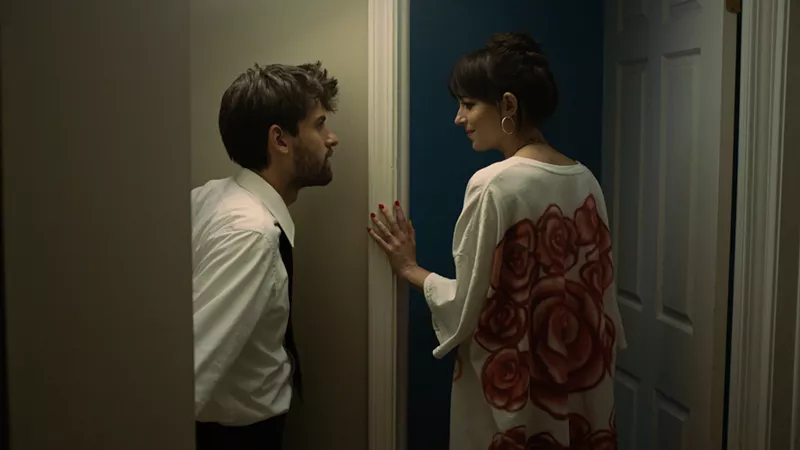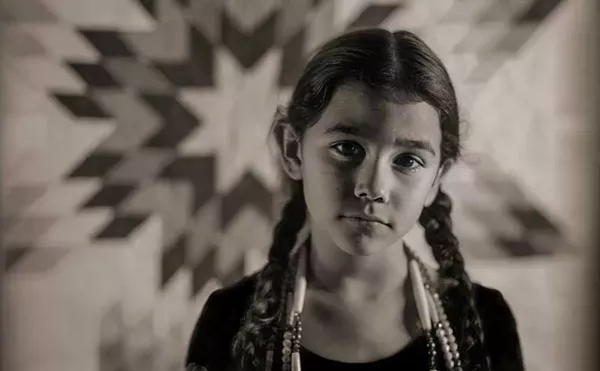
Audio By Carbonatix
[
{
"name": "GPT - Leaderboard - Inline - Content",
"component": "35519556",
"insertPoint": "5th",
"startingPoint": "3",
"requiredCountToDisplay": "3",
"maxInsertions": 100,
"adList": [
{
"adPreset": "LeaderboardInline"
}
]
}
]

Like recent Oscar Best Picture winner CODA, also produced by Apple TV+, Cooper Raiff’s Cha Cha Real Smooth bodes to net a lot of fans — and for almost exactly the same reasons. Both follow an artsy white person’s coming of age (one about to enter college, one just graduated); both explore the joys and woes of quirky nuclear families (one composed primarily of deaf people, one with a bipolar mom or an autistic teenage daughter); both refreshingly normalize people with disabilities, mental or physical, as invaluable parts of their communities. None of these reasons (especially the third) are invalid, and both movies might be considered mainstays for a new wave of inclusivity in American pop culture.
One gains little, however, from watching the films that you could not easily get from the trailer: bright glimpses of laughter and tears that squeal “pathos!” beneath the buoyant score; humans grappling with personal struggles, arriving at camera-ready milestones, then (surprise!) overcoming said struggles with a new sense of shared humanity. Apple TV+ movies present themselves as prestige fare but uncannily resemble the films that, not so long ago, were made-for-TV movies.
In the case of Cha Cha Real Smooth, the film’s thesis — “growing up is hard” — is dispensed mid-hug by Leslie Mann, who plays the middle-aged mom of Andrew (Cooper Raiff), who has recently moved home to New Jersey after attaining a bachelor’s in marketing from Tulane. Paradoxically, Andrew can’t seem to find a job better than at Meat Sticks, a parody of a food court job straight out of 1996. Dejected and desultory after his college girlfriend drops him for some anonymous Barcelonan met abroad on a Fulbright, Andrew is hungry for meaning, desperate to devote himself to a worthy cause.
At a hometown bar mitzvah party, he spots Domino (Dakota Johnson) standing beside her autistic 16-year-old daughter, Lola (Rebecca Burghardt). From Andrew’s vantage, Domino clearly fits the “worthy cause” bill: she is stunning, enigmatic, about 10 years older, and totally in need of a guy like him (Lola needs a sitter, evidently, and Domino, the shoulder of a tall guy to cry on). A raven-maned mélange of “damsel in distress,” “femme fatale,” and “manic pixie dream mom,” Domino is endearingly eccentric (see heavy silver jewelry, tattooed forearms, and hippie name) until she’s not; she cheats on Joseph (Raul Castillo), her hottie lawyer fiancée, and sees her impending marriage as an escape from her demons more than anything else.
But, as they say, one man’s train wreck is another’s Orient Express, and none of Domino’s blazing red flags keep Andrew from wanting to choo-choo away with her into the sunset. “You make me feel safe,” she tells him, inviting him into her home, encouraging his friendship with her lonely daughter, only to cast away Lola’s only pal because he “needs to live his twenties.”
It would be one thing if we were encouraged to see Domino as anything but sympathetic, but we’re not. Despite her selfish, often manipulative behavior, she is presented as a wise “survivor” of the sort that gives life advice from an SUV a few days after breaking your heart. She also entrusts a 22-year-old straight man — one she admits to barely knowing — to regularly be alone, at her home with her post-pubescent autistic daughter. No matter how free-wheeling Domino’s parents might have been, that feels absurd.
Lola and David (Evan Assante), who plays Andrew’s little brother, are easily the most compelling characters, and the scenes in which they appear feel the most plausible and heartfelt. Burghardt, who is on the autism spectrum, shines most in moments where her literal take on social tensions is played for gravity, not for laughs. “I am not trying to be brutal,” she says in one scene, aware that her candor struck Andrew as harsh. When she comes across comically, though, it is downright cringey, as was the Tribeca audience, who applauded cooingly when Burghardt responded that she felt comfortable around the director and “when I’m comfortable around someone, I almost always find it easy to express my thoughts.” It felt like Jerry’s Kids 2.0, only with an autistic girl in too-tall heels center stage.
Raiff, who wrote, directed and starred in the film, is certainly not without talent. He nails the “sweet, bearded goofy guy” trope and clearly had admirable goals in crafting this script. “Not many male directors write women characters like he does,” Johnson said at the Q&A following the film’s Tribeca premiere. She’s right. Raiff — again, admirably — makes more commonly female trials, from solo parenting to losing a pregnancy, part of the film’s plot. But he barely brushes the surface of what these trials entail, betraying, at times, a gross ignorance about how women respond to heavy losses. Would a woman straddle a man and induce foreplay mere hours (minutes?) after suffering a surprise miscarriage? No, she would not.
“Have you ever felt depressed?” Andrew asks Domino, apropos of, well, nothing (her smoky lids?). Evidently, Domino has experienced depression, has long experienced depression, and we learn this not because of any particular behavior or anguish depicted onscreen but because she tells him this over the kitchen counter.
When devastation is framed as mishap and disabilities paraded as quirks, any claim to depth, or inclusivity, starts to feel pretty shallow. Viewers — especially those who pride themselves on some nascent level of wokeness expressed through metal straws and “We Believe…” yard signs — are likely to enjoy this film, and in parts, I can say I certainly did, too (especially the scene where “WAP” is blasted on an eighth-grader dance floor). But it is no revolutionary movie for autistic folks, or bipolar folks, or depressed single moms, or anybody else, and its plot and character holes — especially as far as women are concerned — distract from the parts that shine.
Named for a line in the group dance song often played at weddings and bar mitzvahs, the latter which serves as a glorious narrative excuse for some genuinely delightful party scenes, Cha Cha Real Smooth is a movie about a clueless young man who aspires to be a big, important man made by a slightly less clueless young man who aspires to be a big, important film director. He may be one someday, but not with this movie.
Stay connected with Detroit Metro Times. Subscribe to our newsletters, and follow us on Google News, Apple News, Twitter, Facebook, Instagram, Reddit, or TikTok.







